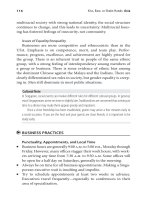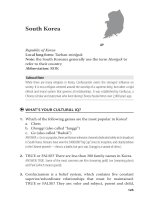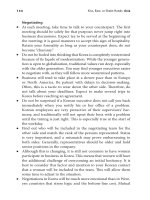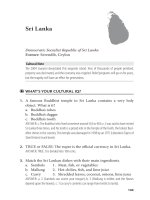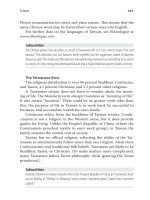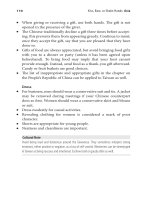How to Do Business in 12 Asian Countries 21
Bạn đang xem bản rút gọn của tài liệu. Xem và tải ngay bản đầy đủ của tài liệu tại đây (109.15 KB, 9 trang )
Pinyin romanization for street and place names. is means that the
same Chinese word may be transcribed various ways into English.
For further data on the languages of Taiwan, see Ethnologue at
www.ethnologue.com.
Cultural Note
The Chinese phrase that describes so much of Taiwanese life is re nau, which means “hot and
raucous.” This describes not just Taiwan’s lively nightlife, but the aggressive nature of daytime
Taiwan as well. The streets and the noise are overwhelming; everyone has something to do and is
in a hurry. It is this energy that developed Taiwan into a major industrial power in half a century.
The Taiwanese View
e religious distribution is over 90 percent Buddhist, Confucian,
and Taoist; 4.5 percent Christian; and 2.5 percent other religions.
A Taiwanese citizen does not have to wonder about the mean-
ing of life. e Mandarin term shengyi translates as “meaning of life.”
It also means “business.” ere could be no greater work ethic than
this: the purpose of life in Taiwan is to work hard, be successful in
business, and accumulate wealth for one’s family.
Confucian ethics form the backbone of Taiwan society. Confu-
cianism is not a religion in the Western sense, but it does provide
guides for living. Unlike the People’s Republic of China (where the
Communists preached loyalty to one’s work group), in Taiwan the
family remains the central unit of society.
Taiwan has no ocial religion, reecting the ability of the Tai-
wanese to simultaneously follow more than one religion. Aside from
Confucianism and traditional folk beliefs, Taiwanese are likely to be
Buddhist, Taoist, or Christian. (To make matters more complicated,
many Taiwanese follow Taoist philosophy while ignoring the Taoist
priesthood.)
Cultural Note
Business travelers to Taiwan should refer to the People’s Republic of China as “mainland China”
and to Beijing as “Peking” or “Beiping,” which means “northern peace” rather than “northern
capital.”
Taiwan
161
162
Kiss, Bow, or Shake Hands: Asia
■
*
Know Before You Go
Taiwan sits in the Pacific’s “Ring of Fire”—right above the juncture of the Philippine
and Eurasian plates—in a seismically volatile region (as evidenced by the earthquake
in September of 1999). Some geologists believe that Taiwan is ultimately doomed. Still,
it is such an economic powerhouse that the risks are far outweighed by the monetary
rewards of establishing facilities on the island. A similar situation exists in many parts of
the U.S West Coast. Earthquakes, typhoons, heavy air pollution, and contaminated drink-
ing water are all hazards that Taiwanese face. Besides being continually cloudy most of
the year, the monsoons generally hit Taiwan from June to August.
●
3
CULTURAL ORIENTATION
Cognitive Styles: How the Taiwanese Organize
and Process Information
Taiwan’s culture is generally closed to outside information but
willing to consider data that conforms to its vital interests. Taiwanese
are trained to think associatively and to stress wholeness over frag-
mentation. ey are more apt to let their personal involvement in a
problem dictate its solution than to use rules or laws.
Negotiation Strategies: What the Taiwanese Accept as Evidence
One’s immediate feelings are the primary source of truth. is
may be biased by faith in the ideologies of nationalism. Recently,
younger Taiwanese are moving toward the use of more and more
facts to justify their decisions.
Value Systems: The Basis for Behavior
Confucianism has a great inuence on Chinese society. It gener-
ates a rigid ethical and moral system that governs all relationships.
e following three sections identify the Value Systems in the pre-
dominant culture—their methods of dividing right from wrong,
good from evil, and so forth.
Locus of Decision-Making
Decisions are made by consensus of the group, which defers to
those who have the most ethos—usually the oldest members. It is
the individual’s duty not to bring shame on any unit of which he or
she is a member—family, group, or organization. Individuals must
also be very careful not to cause someone else to lose face. us,
Taiwanese may speak with vague politeness rather than saying “no.”
ere is a strong authoritative structure that demands impartiality
and obedience.
Sources of Anxiety Reduction
e family is the most important unit of social organization, and
life is an organization of obligations to relationships. e Taiwanese
are highly ethnocentric with a natural feeling of superiority and con-
dence in their political system. is gives them a feeling of national
and personal security. One must work for harmony in the group,
so emotional restraint is prized and aggressive behavior is frowned
upon.
Issues of Equality/Inequality
ere is a strong feeling of interdependence among members of
the family, group, or organization. Businesses are very competitive
and put heavy emphasis on entry-level skills and one’s ability to get
along in the group. Taiwan is still a male-dominated society with
clearly dierentiated sex roles. ere is a strong women’s movement.
●
3
BUSINESS PRACTICES
Punctuality, Appointments, and Local Time
●
Business hours are generally 8:30 .. to noon and 1:00 to 5:00 ..,
Monday through Friday, and 8:30 .. to noon on Saturday.
●
Foreigners are expected to be punctual to meetings. Do not get
upset, however, if your counterpart is late.
●
Evening entertainment is an important part of doing business in
Taiwan, so expect to be out late. It is wise to schedule morning
appointments for late morning. is gives both you and your cli-
ent a chance to rest.
●
Plan a visit to Taiwan between April and September. Many busi-
nesspeople vacation from January through March.
Taiwan
163
164
Kiss, Bow, or Shake Hands: Asia
●
Trac in Taipei is very congested. Unless your next appointment
is so close that you can get there on foot, plan for long travel times
between appointments.
●
Taiwanese write the day rst, then the month, and then the year
(e.g., December 3, 2010, is written 3.12.10 or 3/12/10).
●
For a list of ocial holidays in Taiwan, visit www.kissboworshake
hands.com.
●
Local time is eight hours ahead of Greenwich Mean Time (G.M.T.
+ 8) or thirteen hours ahead of U.S. Eastern Standard Time (E.S.T.
+ 13).
Cultural Note
Modesty is very important in Taiwan. Do not enter an office until you are invited, and do not
seat yourself until you are asked to do so. If you receive a compliment, politely refute it and
expect others to do the same. This should not stop you from complimenting another person,
however, because compliments are always appreciated.
Negotiating
●
e basis of a business relationship in Taiwan is respect and trust.
Take time to establish a rapport with your counterpart. Initially,
you will have to overcome the Taiwanese distrust of Westerners.
Meet face-to-face as oen as possible, and keep in touch aer
your trip is over.
●
Taiwan is relatively similar to other East Asian countries. e
Chinese in Taiwan are capitalists with the same motivations for
doing business as the Japanese. However, while Taiwan may seem
very westernized, the heart of the culture is still very traditional.
●
Business will tend to take place at a slower pace than in North
America or Europe. Be patient with delays. Oen, this is a tactic to
wear down the other side. erefore, do not talk about your dead-
lines. Expect to make several trips before reaching an agreement.
●
Your negotiating team should include persons with seniority and a
thorough knowledge of your company. Most importantly, include
an older person. e Chinese revere age and status—sending a
senior executive shows that a company is serious about starting a
business relationship.
●
Brute honesty is not appreciated in Taiwan. A direct “no” is con-
sidered rude. Learn to speak in and listen to subtleties. A “yes” or
nod of the head may mean “maybe” or “I understand.” A “maybe”
usually means “no.”
●
When negotiating, be sincere and honest. Humility is a virtue,
and a breach of trust, since trust is a vital factor in business rela-
tionships, will not be taken lightly. (Most proposals and potential
business partners will be thoroughly investigated.)
●
Emphasize the compatibility of your two rms, your personal
amicability, and your desire to work with your counterpart. Prots
are very important, but harmonious human interaction precedes
them in importance. Avoid high-pressure tactics.
●
Saving “face” or individual dignity is a very important and delicate
matter. erefore, never embarrass another person, especially in
public.
●
Never criticize your competition or avoid admitting that you do
not know the answer to a question.
●
Consider sending your proposals in advance of your visit for your
host to preview. At a presentation, recap the major points at the
beginning and at the end. Look for cues that your counterpart did
not understand you. Do not expect him or her to tell you when this
happens, because this will be embarrassing. Break up the infor-
mation into small segments with pauses for question-and-answer
periods. Be patient with extensive questioning. Address the chief
negotiator occasionally, even if he does not speak English.
●
Avoid using your hands when speaking. Chinese rarely use their
hands while speaking and become distracted by a speaker who
does.
●
Business is competitive in Taiwan. Be prepared to discuss all parts
of your proposal in detail. Bargaining is also a way of life, so be
prepared to make concessions.
●
Be sure to have products patented or registered in Taiwan to pro-
tect yourself against imitation.
Taiwan
165



